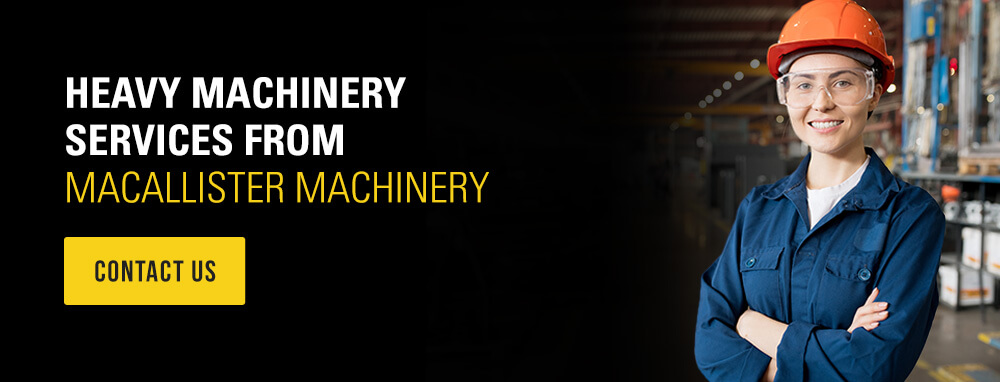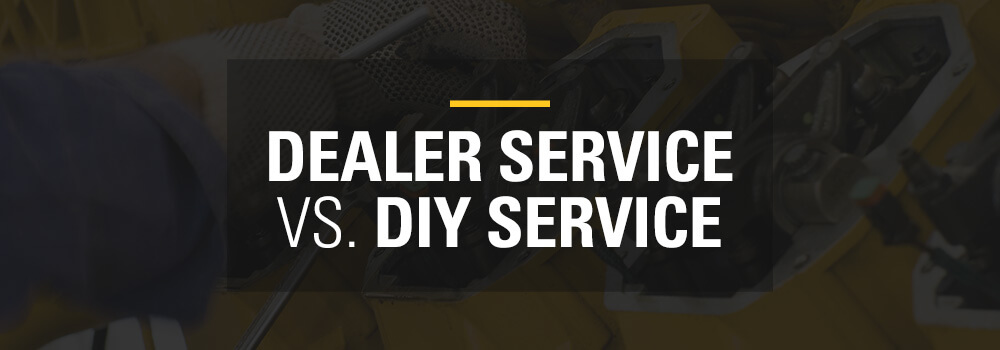
There are times when going for dealer service is a better option than doing it yourself (DIY) and vice versa. Weighing the advantages and disadvantages of both service options can help you choose the best plan for your equipment and operations.
Jump to Sections:
- Factors to Consider
- Benefits of DIY Service
- Benefits of Dealer Service
- Common DIY Maintenance Services
- When to Seek Dealer Services
- Services From MacAllister Machinery
Learn more about the pros and cons of professional versus DIY services and the considerations that accompany both options.
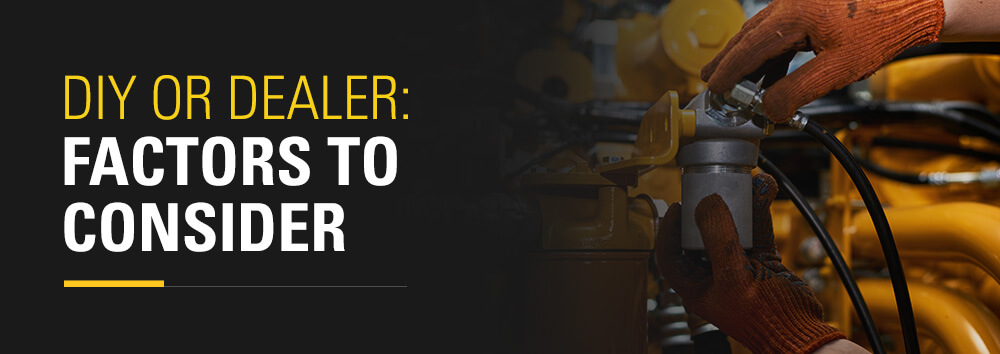
DIY or Dealer: Factors to Consider
When deciding on dealer or DIY maintenance for your heavy equipment, a few considerations may sway your decision. Whether you choose to service your equipment in your own shop or take it to a dealership, there are pros and cons to both options.
The following are some points to think about when choosing between dealership maintenance or doing it yourself:
1. Price
When comparing DIY versus dealer service, each option is associated with different costs. Doing maintenance on your own is typically cheaper than going to a dealer.
Going to a dealer means you pay for both maintenance costs and the expert technician’s work. This usually means a higher price point than doing the work for yourself.
In addition to service prices, you might need to opt for rental equipment while yours is being serviced. Whether you have chosen to perform DIY or dealership service, you will likely need to pay for rentals if you do not have the equipment you need readily available to you.
You should also consider costs for transportation and operational downtime. You can complete DIY service sooner as you won’t have other pieces of equipment to maintain like a professional would. If you can maintain equipment on-site, you won’t need to pay to transport it to a dealer.
2. Warranty on Workmanship
A workmanship warranty covers you against errors made during the installation or repair processes. If you choose to do your own maintenance, there is no warranty to protect yourself from possible mistakes made while servicing your equipment.
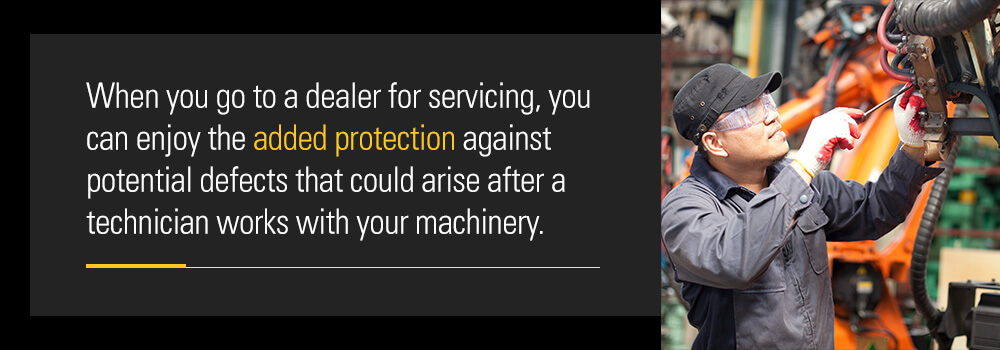
When you go to a dealer for servicing, you can enjoy the added protection against potential defects that could arise after a technician works with your machinery.
If you make an error during DIY maintenance efforts, this could lead to greater issues that cost more time and money to correct.
3. Recalls
If the manufacturer of your equipment announces a recall on one of your parts, it is best to address this promptly.
By not correcting recalls right away, you can create further problems with your equipment down the line. Plus, some recalls are very serious and can be dangerous if you choose to ignore them.
Dealerships often cover warranty repairs and parts. If you decide to approach a recall on your own, you might find yourself paying for the replacement parts needed to keep your equipment running and minimize downtime.
4. Environment
The environment is often very different at a dealer versus wherever you complete DIY service on your equipment. At a dealership, there is usually more control over the environment. They are often clean and organized to comply with safety standards.
Doing repairs while at a worksite can mean more dirt and clutter surrounding you while you address the issue. This can make for a more complicated process than going to a dealer.
5. Tools
A dealership will have all the tools and parts needed to service your equipment. This means a more streamlined repair process that can take less time. When you choose to do the work on your own, you might find yourself in need of different tools than what you have in your toolbox or warehouse.
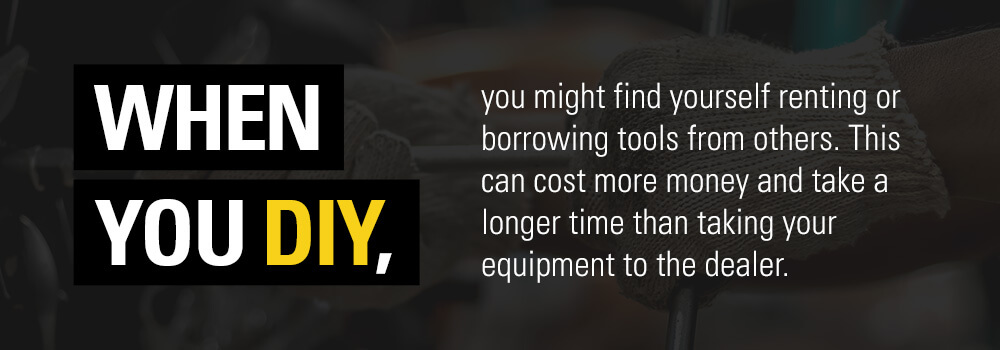
When you DIY, you might find yourself renting or borrowing tools from others. This can cost more money and take a longer time than taking your equipment to the dealer.
Dealerships have tools for analyzing your equipment. For example, if you need your fluids tested, professional sites have the tools to conduct a comprehensive Machine Fluid Analysis for coolants and oil. This service solution can help with the following:
- Detecting problems early
- Helping anticipate and schedule downtime
- Monitoring positives and negatives
- Allowing you to monitor maintenance schedules
- Enabling you to manage budgets better
- Helping you develop a complete service history
Most people do not have the tools or technology to monitor their equipment and optimize its functioning on their own.
6. Training
At dealerships, the employees are highly trained and are usually certified technicians who have experience servicing all kinds of equipment. Training also allows for speedier services as the expert staff knows exactly what they are doing and how to do it.
By choosing to work on your equipment on your own, you forfeit some of that expertise. However, there are many resources available for people who are interested in DIY services. You can often find video instructions online or find steps to follow in your equipment’s manual. Some people choose to consult with a trained professional while they do the work on their own.
7. Time
When you go to a dealership, the actual work on your equipment is likely to take less time. Expert technicians are usually speedier than people who are doing the work themselves.
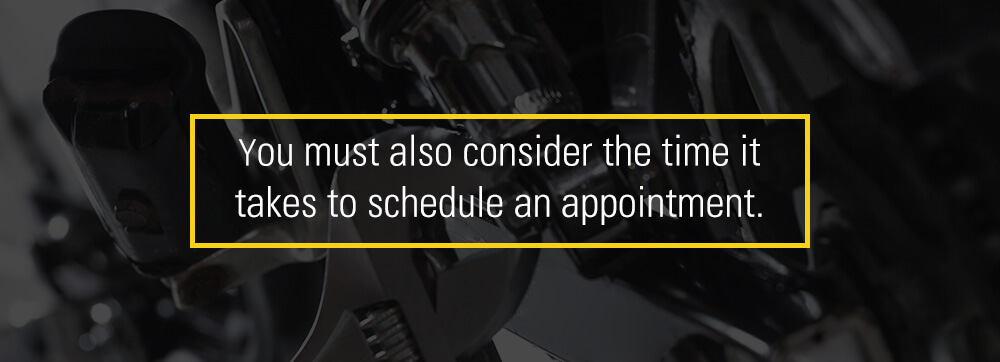
However, you must also consider the time it takes to schedule an appointment. A dealership might be booked for days or weeks in advance, leaving you with downtime until your machinery is ready for action. You have to consider the time it takes to transport heavy machinery to and from the dealer, as well.
As a business owner, you might not have the extra time to do the work on your equipment. Having it taken to a dealership might be more beneficial and efficient for you.
8. Loaner Equipment
When you take your equipment in for a repair, some dealerships will provide you with a loaner so you can continue working until your machinery is ready. You’ll save time searching for rental equipment if the dealer has options to choose from.
If you go the DIY route and there is downtime, you will likely end up needing to rent replacement equipment from elsewhere. This can add more time and costs spent on your operations.
9. Transportation
One of the benefits of DIY service is doing the work where you are and not having to transport your equipment to the dealership.
Transporting heavy equipment can be complicated and potentially lead to downtime, especially if the closest dealership is not conveniently located.
Doing the work at your shop is sometimes the most simple solution. No need to spend the time or money on the following:
- Getting the equipment ready for transport
- Transporting the equipment to the dealer
- Having the equipment transported back to your worksite
10. Technology
For high-tech equipment, going to a dealer is probably your best bet. Unless you have a background in software and calibration, it is best to let professionals address technological issues.
DIY could further complicate the issues if you are not sure what you are working with. Problems with your machinery’s technology can be expensive and require expert attention.
Dealerships have technicians who are well-versed in the technologies integrated into equipment, and they can address your needs. Whether you need help with your GPS survey equipment or GPS-guided machine control systems, a dealership will likely have the productivity and technology solutions for keeping your machinery operational.
11. Second Set of Eyes
When you choose to go to a dealer, their technicians have expansive knowledge of equipment mechanics. They are less likely to miss or overlook something while working. There are coworkers to consult with and double-, even triple-check completed services and ensure they’ve addressed any problems adequately.
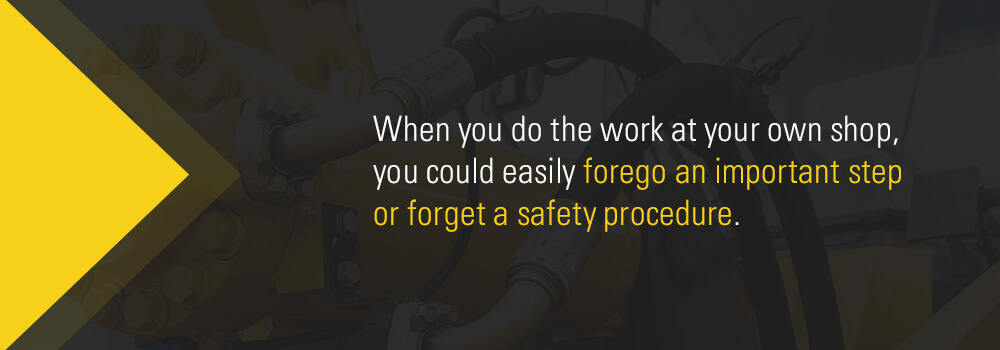
When you do the work at your own shop, you could easily forego an important step or forget a safety procedure. Going to the dealer might save you money down the line, especially if you neglected to identify all the issues present with your equipment.
12. Second Set of Hands
DIY maintenance may be convenient, but it does have some drawbacks. If you have limited personnel, this might mean you are doing the work alone. There may be no one to grab a tool or give you a hand when you need one. Doing maintenance entirely solo could also be a safety concern.
At a dealership, there are always multiple people around, ready to help out. Work can get done faster with a second set of hands. With multiple experts contributing their know-how, you might even get a better result.
13. Quality Service
At a dealership, the staff is knowledgeable about the services they provide. The more expertise a crew has, the quicker and more accurately they can identify and troubleshoot issues. While servicing your vehicle, a technician may notice something else that needs attention that you weren’t aware of.
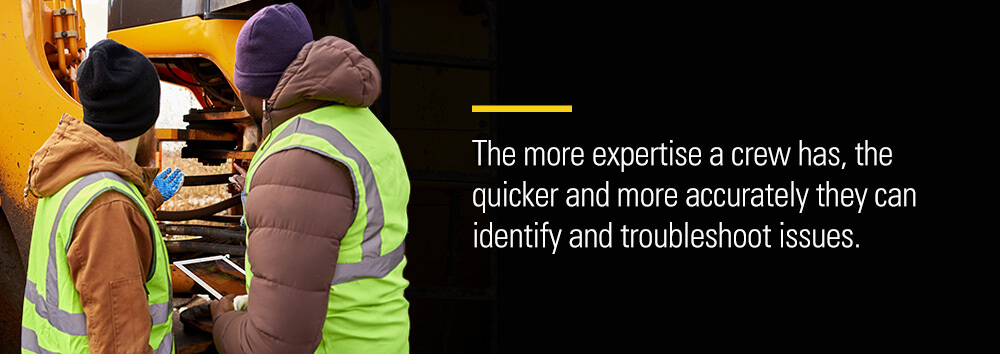
When you choose to work on your equipment by yourself, you may not catch every detail or give each part the attention it needs. Ultimately, you are likely to walk away with poorer quality service.
Professional services are often more comprehensive and can provide your operation with the following:
The quality of the service is typically better at a dealer than doing it on your own. This is a culmination of the skilled staff and high-quality supplies at a dealership.
14. Service Reminders
One of the pros of dealership maintenance is getting regular service reminders. Doing the work on your equipment means there is no one to keep track of the maintenance performed or let you know when you should come back for a tune-up.
Dealerships are more likely to have organized record-keeping than those who opt for DIY service. With that, if you do perform maintenance on your heavy equipment, it is a good idea to keep detailed records of what you did, to what parts and when.
15. Surprises and Oversights
Performing DIY service can lead to many surprises. Maybe you spot something else that needs fixing or you learn that the problem is not what you had in mind. If you assume you need repairs for one issue, but it’s actually another concern, you might find yourself unprepared. You’ll want to consider these factors when deciding between DIY and dealer service.
When you take your equipment to a dealer, they have the tools and knowledge to address a wide variety of services. It is much easier for dealership staff to change repair plans than someone with limited resources in their own shop.
16. Learning New Skills
DIY can be a great way to pick up new skills and expand your understanding of the equipment you work closely with every day. It can be very valuable in the future to know how to address certain issues or replace parts. Performing these actions on your own can help you learn and grow as an operator.
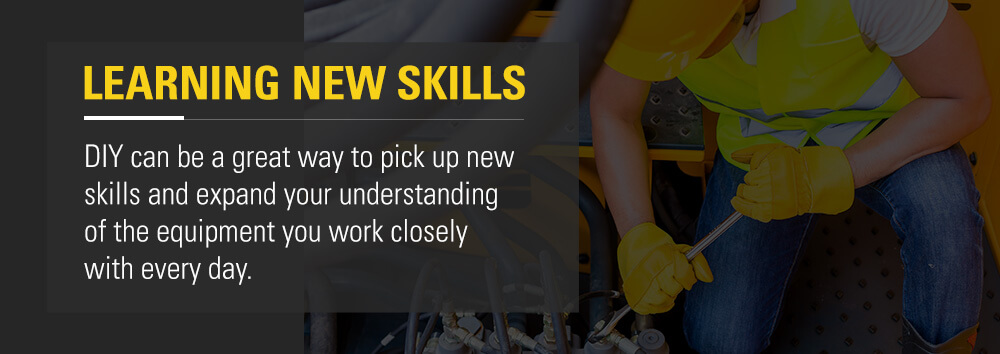
By going to a dealership, you might not be there to see the repairs in action. You may leave without knowing the steps that the technicians took to fix your problem. If you have the same issue later on, you will have to bring the equipment back again.
But, if you learn how to service your equipment, you can save time and take care of it on your own if it happens again.
17. Materials
One of the greatest benefits of dealership service is access to high-quality materials. Dealers often have the parts and fluids that are specific to your equipment’s model. OEM parts are the best option for your heavy machinery.
If you choose to do the work on your own, you might not have the same materials on hand. You also may not know which options are best for your model.
Benefits of DIY Service
All things considered, the following are the benefits of doing your own service on your heavy equipment:
- Costs: Doing the work yourself costs less than going to a dealer.
- Time: DIY means less time spent scheduling an appointment and finding time to get the equipment to the dealer.
- Transportation: When you work on your equipment, you do not need to worry about transportation because you can work right in your own shop.
- Convenience: By performing maintenance tasks on your own, you can enjoy the convenience of on-site service when you have the time to do so.
- Flexibility: DIY service allows you to be more flexible, and you can contact a dealer for field service if needed.
- No appointments: There is no need to wait around for an appointment if you do your own service. You could repair your equipment in the time it takes to schedule an appointment.
- Building experience: By doing the work on your own, you can pick up new skills and build your experience servicing different parts. Eventually, you’ll be able to do more DIY work.
Benefits of Dealer Service
There are many benefits to taking your equipment or parts to a dealer for service, including the following:
- Warranties: Dealerships often cover warranty costs for recalled parts and equipment, which saves you replacement costs. Also, they usually have workmanship warranties that cover problems caused by installation and repair efforts.
- Clean environment: Unlike many worksites, dealers keep their shops tidy and clean for both safety and sales purposes.
- Tools, technology and materials: Dealers have the necessary tools and technology to perform repairs quickly and effectively. No need to purchase new tools or wait for delivery. Dealerships often have high-quality materials and fluids on hand that coincide with your equipment’s specific model, as well.
- Experienced staff: Dealerships have knowledgeable teams of technicians ready to service your equipment quickly and effectively. They are certified and have experienced colleagues to offer assistance when needed.
- Loaner and rental equipment: One of the greatest benefits of dealer service is access to loaner equipment and rentals. This helps reduce downtime and keep operations running smoothly.
- Reminders: Dealers often have better record-keeping regarding their services. Some dealers send out reminders when it is time to revisit maintenance tasks like changing the oil or replacing worn parts.
Common DIY Maintenance Services
For those who enjoy a little elbow grease, some DIY services are simple and can be completed at your own shop with a little guidance. The following are common services you can do by yourself:
- Changing the engine oil and filter
- Changing the final drive oil
- Greasing points
- Daily maintenance
- Changing the air filter
- Changing fuel filters
It is crucial to note that before completing any service, you should consult your operation and maintenance manual. Here you will find specific instructions for your equipment. The locations and specifications of your machine’s parts vary by model.
When to Seek Dealer Services
Professional servicing and repairs for your heavy equipment are preferable for certain tasks. When working with the following issues, it is best to consult a professional:
- Overheated engine
- Mechanical injector issues
- Electrical problems
- Hydraulic issues
Any services that you feel are unsafe or you find to be too confusing should be handed over to a professional. It is always best to err on the side of caution.
There are alternative options for equipment maintenance. If you feel you cannot perform maintenance on your equipment or parts and the following is happening, consider opting for field service:
- You need your equipment up and running as soon as possible
- Your equipment is too large for transport
- Your equipment is immobile
Field Service
You might contact a dealership for something called field service if something goes awry with one of your pieces of heavy equipment. Field service is a great resource for both emergency repairs and preventative maintenance.
Common field services include the following maintenance practices:
- Generator and switchgear service
- Engine service
- Undercarriage repairs and maintenance
- Oil sampling
- Welding and fabrication
Field services are quick and often the fastest way to get a piece of equipment up and running. Without having to pay for transportation, you can save costs by having a professional come to you. This also spares your transportation equipment the wear and tear of getting immobile machinery to a dealership.
Heavy Machinery Services From MacAllister Machinery
Heavy equipment requires consistent service and preventative maintenance to run its best. For people who know their way around their equipment and don’t mind getting a little dirty, DIY service for minor issues can save time and costs. For more complicated issues, consulting with a professional is always a good idea.
MacAllister Machinery has the parts and services for your maintenance needs. With around-the-clock customer support and our comprehensive parts solutions, we can get your equipment up and running to keep your operation productive and on track. Our experienced technicians can perform expert machine services, and we have cutting-edge tools and technology for the most effective solutions.
Contact us today to learn more.

